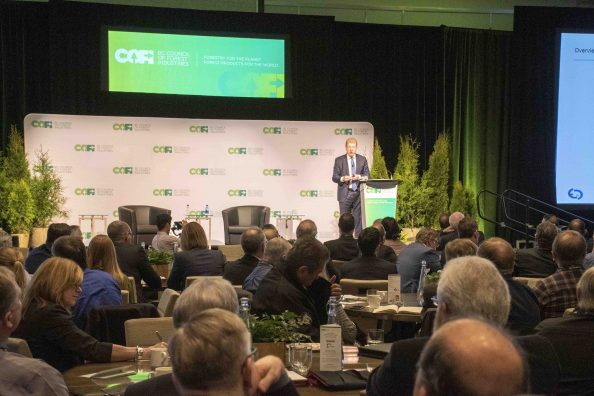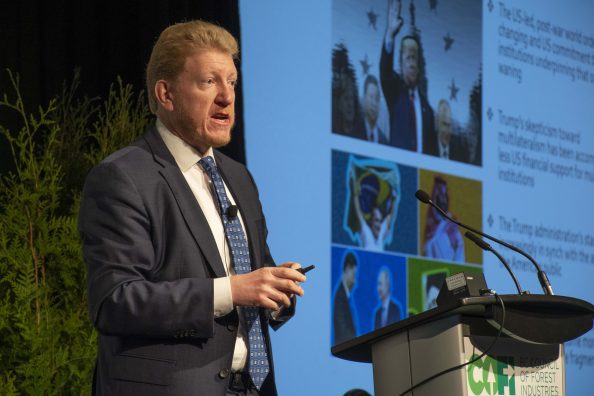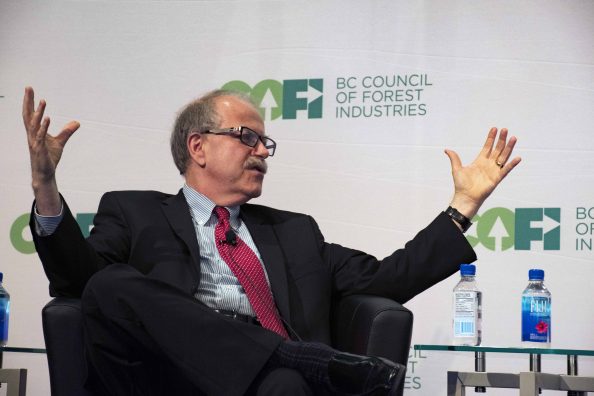 Early up on COFI’s conference agenda were two keynote speakers addressing risk & opportunity and the economic outlook for the forest sector. Robert Johnston of the Eurasia Group, spoke of the risks and opportunities from a globalization and geopolitics perspective. According to Johnston, the top risks lie in the US-China relationship, European populism (e.g., their version of America First) and the increase in non-democratic leaders around the world—particularly given the decline in US support for the institutions the West has relied on for economic order (e.g., NATO, IMF, NAFTA, etc.).
Early up on COFI’s conference agenda were two keynote speakers addressing risk & opportunity and the economic outlook for the forest sector. Robert Johnston of the Eurasia Group, spoke of the risks and opportunities from a globalization and geopolitics perspective. According to Johnston, the top risks lie in the US-China relationship, European populism (e.g., their version of America First) and the increase in non-democratic leaders around the world—particularly given the decline in US support for the institutions the West has relied on for economic order (e.g., NATO, IMF, NAFTA, etc.).
 Although Johnston assumes China and the US will solve their current trade war, he believes it will be a short “sugar high” as the underlying country disagreements are more serious and long-lasting. This includes disputes on national security, global leadership and future technology, which is where the “next war” will be fought, according to Johnston. Unfortunately for Canada, which is caught between the two, this means choosing between Team China and Team US. And while Canada will have to choose the US, it may be costly as China is evolving their economy and investing to lead in many areas of the world economy. Finally, Johnston spoke of the importance of renewables and the growing investor pools that are looking for ESG (environmental, social and governance) friendly companies and products.
Although Johnston assumes China and the US will solve their current trade war, he believes it will be a short “sugar high” as the underlying country disagreements are more serious and long-lasting. This includes disputes on national security, global leadership and future technology, which is where the “next war” will be fought, according to Johnston. Unfortunately for Canada, which is caught between the two, this means choosing between Team China and Team US. And while Canada will have to choose the US, it may be costly as China is evolving their economy and investing to lead in many areas of the world economy. Finally, Johnston spoke of the importance of renewables and the growing investor pools that are looking for ESG (environmental, social and governance) friendly companies and products.
 Jock Finlayson followed with a snapshot of the US, Canada and BC’s economic outlook, which he described as “slowing”. The downside drivers being: the US housing market—which remains well below past highs; Canada’s competitiveness vis-à-vis the US—particularly in the area of regulation; and the lack of investment in machinery and equipment. Key risks include current low-interest rates as there is little room to move them down in the next recession, and the lack of export growth, which he calls “the lifeblood of the economy”.
Jock Finlayson followed with a snapshot of the US, Canada and BC’s economic outlook, which he described as “slowing”. The downside drivers being: the US housing market—which remains well below past highs; Canada’s competitiveness vis-à-vis the US—particularly in the area of regulation; and the lack of investment in machinery and equipment. Key risks include current low-interest rates as there is little room to move them down in the next recession, and the lack of export growth, which he calls “the lifeblood of the economy”.
According to Finlayson, BC shares most of these risks but the past five years have been fairly good and the proposed LNG development bodes well for the near future. Finlayson closed by noting his frustration with policy folk who tend to look for growth in the “flavour of the month”, rather than starting with our industrial strengths and build on them; and those that make significant commitments—such as UNDRIP (the UN Declaration on the Rights of Indigenous Peoples) before they know how it will actually work in reality.